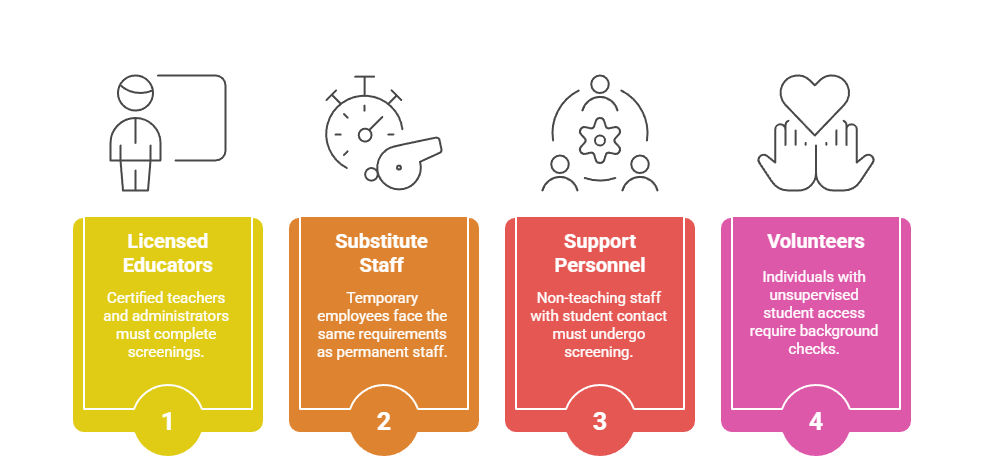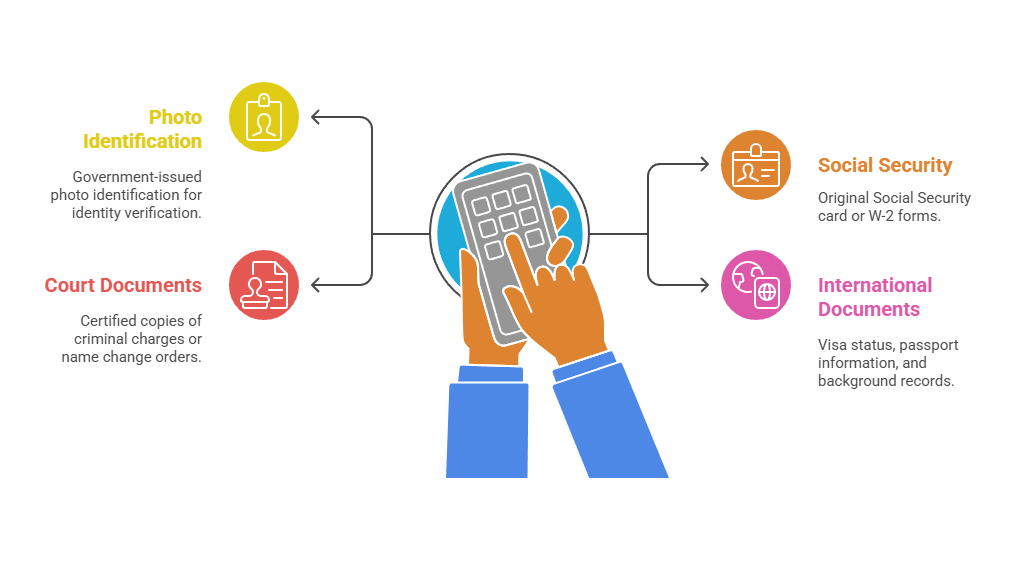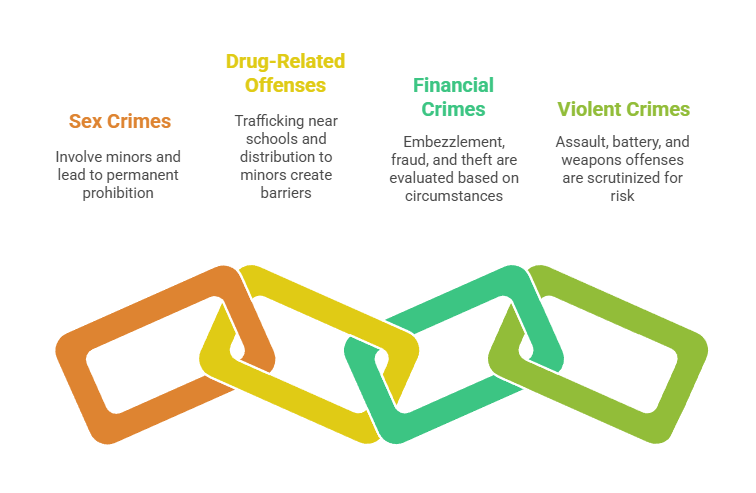New Mexico requires comprehensive background checks for all educators through the Public Education Department's rigorous screening process, examining criminal history, child abuse records, and professional sanctions before employment begins. The state mandates these checks for teachers, administrators, substitutes, and support staff to ensure student safety across all public and private educational institutions.
Key Takeaways
- All educators in New Mexico must complete fingerprint-based background checks through the state's Public Education Department before employment begins.
- Background checks cost between $65-85 total, including FBI and state processing fees that candidates typically pay directly.
- Screenings examine criminal history, sex offender registries, child abuse records, and professional license sanctions nationwide.
- Checks remain valid for continuous employment but require renewal when changing districts or returning after breaks in service.
- Processing time ranges from 5-15 business days, though complex cases may take longer for comprehensive review.
- Failed background checks can be appealed through the Professional Practices Division with proper documentation and legal representation.
Overview of New Mexico Teacher Background Check Laws
New Mexico maintains comprehensive educator screening requirements to protect students and uphold educational standards. The state's Public Education Department oversees all background check processes for teachers, administrators, substitutes, and support staff. These requirements apply uniformly to both public and private schools throughout the state.
The screening process covers anyone seeking employment in New Mexico schools, regardless of their role or employment duration. This includes full-time teachers, substitute educators, coaches, counselors, administrative staff, and volunteers with unsupervised student access. The state requires both initial screenings for new hires and ongoing monitoring throughout an educator's career.
New Mexico's approach mandates continuous background monitoring rather than one-time checks. This system alerts school districts to any criminal activity or professional sanctions that occur after initial employment. The comprehensive nature of these requirements reflects the state's commitment to maintaining safe learning environments while ensuring qualified professionals can serve New Mexico's diverse student population.
Who Must Complete Background Checks in New Mexico Schools
All individuals working in educational settings must complete New Mexico teacher background check requirements before beginning employment. The state maintains strict compliance standards that apply uniformly across all school districts and educational institutions. Additionally, the process includes multiple verification steps to ensure thorough screening of all potential educators and support staff.

- Licensed teachers and administrators: All certified educators must complete comprehensive screenings before receiving state licenses or beginning classroom assignments.
- Substitute teachers and temporary staff: Short-term and occasional employees face identical requirements as permanent staff members without exceptions.
- Support personnel and paraprofessionals: Non-teaching staff with student contact must undergo the same screening process as certified educators.
- Volunteers and student teachers: Individuals with unsupervised student access require background checks regardless of compensation or employment status.
Districts cannot employ any personnel while background checks are pending except in extreme emergencies with superintendent approval. Emergency authorizations require immediate background check initiation and cannot exceed specific time limits set by state regulations.
Licensed Educators and Administrative Staff
All individuals seeking teaching licenses or educational leadership positions must complete comprehensive background screenings before receiving state certification. This requirement covers elementary and secondary teachers, special education specialists, school counselors, and librarians. The state also includes administrative personnel such as principals, superintendents, and district-level administrators in these requirements.
Licensed staff members transferring from other states must complete New Mexico's background check process even with valid clearances elsewhere. The state does not accept reciprocal background check agreements from other jurisdictions, ensuring consistent screening standards. This policy applies regardless of the educator's years of experience or previous clearance status in their former state.
Substitute Teachers and Support Personnel
Substitute teachers face identical background check requirements as full-time educators, with no exceptions for short-term assignments. Districts cannot employ substitute teachers while background checks are pending, making advance planning essential for staffing. The state requires background checks for student teachers and practicum students who will have unsupervised access to children during training.
University teacher preparation programs coordinate these checks with cooperating school districts to ensure compliance before placements begin. Student teachers cannot start classroom assignments until background check results are approved and filed with both institutions. Support staff including bus drivers, cafeteria workers, and maintenance personnel also require screening when they have regular student contact.
Required Components of New Mexico Educator Background Checks
New Mexico's educator background check process examines multiple databases and record systems to create comprehensive safety profiles. The state requires both federal and state-level screenings to identify any disqualifying factors affecting educational employment suitability. These components work together to provide school districts with thorough information about potential employees' backgrounds and factors impacting student safety.
| Component Type | Scope | Processing Time |
| Criminal History | State and Federal Records | 3-7 Business Days |
| Child Abuse Registry | State and National Databases | 2-3 Business Days |
| Sex Offender Registry | Multi-State Search | 1-2 Business Days |
The screening process includes automated database searches and manual review procedures to ensure accuracy and completeness. State officials cross-reference multiple data sources to identify gaps or inconsistencies in applicant background information.
Criminal History and Court Records
Criminal background checks examine records from all jurisdictions where applicants have lived, worked, or attended school during the past seven years. The screening includes felony and misdemeanor convictions, pending charges, arrests, and court dispositions from state and federal databases. New Mexico also reviews records from tribal courts and military justice systems when applicable to ensure comprehensive coverage.
The state examines both conviction records and arrest information, though arrests without convictions receive different consideration during evaluation. Sex crimes, violent offenses, drug-related charges, and crimes against children receive particular scrutiny regardless of occurrence timing. Financial crimes, theft, and fraud also trigger careful review due to their relevance to educational employment and public trust responsibilities.
Child Abuse and Neglect Registry Searches
New Mexico searches its Child Abuse and Neglect Information System (CANIS) database to identify any substantiated reports involving applicants. The state also queries the National Child Abuse and Neglect Data System to identify records from other states. These searches reveal any founded allegations of child abuse, neglect, or exploitation that could disqualify someone from educational employment.
Child abuse registry information remains permanently accessible and cannot be expunged or sealed, making this component particularly significant for long-term employment eligibility. The state reviews both substantiated cases and pending investigations that might affect an applicant's suitability for working with children. Cross-referencing occurs with Department of Children, Youth and Families records to ensure complete coverage of all relevant incidents and investigations.
Background Check Application Process and Timeline
The school employee screening process begins with online application submission through the state's secure portal system. Applicants must create accounts, upload required documents, and schedule fingerprinting appointments at approved locations throughout the state. The digital system streamlines initial processing while maintaining security standards for sensitive personal information and background data.
Processing timelines vary based on application complexity, the number of jurisdictions requiring review, and current volume levels at processing agencies. Most straightforward cases complete within the standard timeframe, while applications involving multiple states, name changes, or potential record matches may require additional investigation time. Applicants can track their progress online and receive notifications when results become available to their prospective employers.
Required Documentation and Application Materials
Candidates must submit complete applications including personal history forms, identification documents, and employment authorization verification before scheduling fingerprinting appointments. The state requires detailed residence and employment histories covering the past seven years, including addresses, dates, and contact information for verification purposes. Incomplete applications result in processing delays and may require resubmission with additional fees.

- Government-issued photo identification: Driver's license, state ID card, or passport for identity verification during fingerprinting appointments.
- Social Security documentation: Original Social Security card or W-2 forms showing complete Social Security numbers for database searches.
- Court documents if applicable: Certified copies of any criminal charges, dispositions, or name change orders for accurate record matching.
- International documentation: Visa status, passport information, and available background records from countries of origin for foreign applicants.
The state may require certified translations for documents not written in English. International applicants face additional requirements including background checks from their home countries when available through official channels.
Fingerprinting Locations and Scheduling
Digital fingerprinting occurs at approved locations including school district offices, law enforcement agencies, and private fingerprinting services contracted with the state. Appointments typically take 15-30 minutes and include identity verification, fingerprint capture, and fee payment processing. Applicants receive confirmation receipts showing successful submission to both state and federal databases.
Quality fingerprints are essential for accurate database matching and processing efficiency. Poor print quality results in rejection and requires repeat appointments, causing delays in the overall timeline. Most locations offer multiple appointment times throughout the week to accommodate applicant schedules and urgent hiring needs.
Background Check Costs and Fee Structure
Background check costs include both state and federal processing fees that applicants typically pay directly to avoid delays in the hiring process. The total cost ranges from $65-85 depending on specific screening components required and any additional services needed for complex cases. These fees cover database access, manual review processes, and administrative costs associated with maintaining the state's background check system.
Payment methods include online credit card processing, money orders, and cashier's checks, though electronic payment options provide faster processing and immediate confirmation. Some school districts reimburse background check costs for hired employees, while others include these expenses in their recruitment budgets. Applicants should confirm payment responsibilities with prospective employers before beginning the background check process.
| Fee Component | Cost | Payment Method |
| State Processing Fee | $29.25 | Online or Money Order |
| FBI Fingerprint Fee | $37.75 | Included in Application |
| Additional Services | $15-25 | Case-by-Case Basis |
Fee structures remain consistent statewide, though some districts may offer reimbursement programs or advance payment options for qualified candidates. The state does not offer fee waivers or reduced-cost options, making the full payment requirement a consideration for potential educators entering the profession.
Processing Timeline and Status Tracking
Most background checks complete within 5-15 business days from fingerprint submission, though complex cases may require extended review periods. The state prioritizes applications for critical shortage areas but maintains thorough review standards regardless of staffing needs or employment urgency. Applicants receive email notifications at key processing stages and can check status updates through the online portal system.
Delays commonly occur when records require manual review, multiple jurisdictions need coordination, or applicants have common names requiring additional verification. Name changes, maiden names, and aliases can extend processing time as investigators verify identity and ensure complete record searches. International background components also add time when obtaining records from foreign governments or agencies.
Rush processing options are available for urgent hiring situations at additional cost, though these services cannot compromise the thoroughness of required screenings. Emergency hiring provisions exist for extreme circumstances but require superintendent approval and immediate background check initiation. These temporary authorizations have strict time limits and cannot be extended beyond state-mandated periods.
Disqualifying Factors and Review Criteria
New Mexico law specifies automatic disqualifiers that prevent employment in educational settings regardless of rehabilitation efforts or time elapsed since incidents. These include convictions for sex crimes, violent felonies against children, murder, and certain drug trafficking offenses. The state also disqualifies individuals with substantiated child abuse findings or those appearing on sex offender registries in any jurisdiction.
Other criminal convictions receive individual review considering factors like offense severity, time elapsed, rehabilitation evidence, and relevance to educational employment. The state evaluates patterns of behavior, victim impact, and community safety concerns when making discretionary decisions about employment eligibility. This review process allows qualified individuals with minor or dated offenses to pursue educational careers while maintaining student safety priorities.

- Automatic disqualifiers: Sex crimes involving minors, violent crimes against children, murder, kidnapping, and aggravated assault convictions result in permanent employment prohibition.
- Drug-related offenses: Trafficking near schools and distribution to minors create automatic barriers, while possession charges receive individual review based on circumstances.
- Financial crimes: Embezzlement, fraud, and theft convictions undergo evaluation considering amounts involved, victim types, and rehabilitation evidence.
- Violent crimes: Assault, battery, and weapons offenses receive scrutiny based on victim relationships, circumstances, and potential risk to students.
The state maintains a comprehensive database of disqualifying offenses that automatically trigger rejection notifications during background screening. These cases do not proceed to manual review stages, and applicants receive immediate notification of their ineligibility for educational employment.
Appeals Process and Second Chances
Non-automatic disqualifications may be appealed through the Professional Practices Division within 30 days of receiving negative determination notices. The appeal process requires legal representation or advocacy support, comprehensive rehabilitation documentation, and community impact statements demonstrating fitness for educational employment. Appeals involve formal hearings with evidence presentation and witness testimony opportunities.
Successful appeals typically involve minor offenses, substantial rehabilitation evidence, and strong community support for the applicant's character and professional qualifications. The appeals board considers victim impact, public safety concerns, and the applicant's potential contributions to education when making final determinations. Most appeals take 60-90 days to complete, during which employment cannot begin pending final decisions.
Validity Periods and Renewal Requirements
Teacher background checks remain valid for continuous employment within the same school district but require renewal when changing employers or returning to education after breaks in service. The state monitors educators continuously through automated database alerts that notify districts of any criminal activity or professional sanctions occurring after initial employment. This ongoing monitoring system eliminates the need for periodic renewal as long as employment continues uninterrupted.
Educators changing districts must complete new background checks even if their previous screenings are recent and clear. The state does not transfer background check results between employers, requiring fresh screening for each new position. This policy ensures that all districts receive current information and maintain direct responsibility for their employment decisions.
Substitute teachers working across multiple districts need separate background checks for each employing district, though some regional cooperatives allow shared screening results among member districts. Long-term substitutes and temporary employees face the same renewal requirements as permanent staff when their assignments extend beyond typical substitute arrangements. These requirements can create administrative burdens for educators seeking flexible employment across district boundaries.
Special Considerations for Different Employee Categories

Different types of educational employees face varying requirements based on their roles, responsibilities, and student contact levels. The state recognizes that not all positions carry identical risk levels but maintains comprehensive screening standards across most categories. However, specific procedures and timelines may differ based on employment type and district policies.
Out-of-State Teacher Transfers
Educators relocating from other states must complete full New Mexico background checks regardless of their clearance status in previous locations. The state does not accept reciprocal agreements or expedited processing for experienced teachers with clean records in other jurisdictions. This requirement can delay hiring processes and create challenges for districts recruiting nationally for hard-to-fill positions.
Out-of-state applicants must provide comprehensive documentation of their residence and employment history, including any gaps in employment or education. The state requires additional verification for periods spent in other countries or jurisdictions with limited record-keeping systems. These requirements can extend processing times and require additional documentation beyond standard application materials.
Private School and Charter School Requirements
Private schools in New Mexico must comply with the same background check requirements as public institutions when employing state-certified teachers or receiving public funding. Schools operating independently without state certification or funding may establish their own screening policies but cannot employ individuals disqualified from public education. Most private institutions voluntarily adopt state standards to ensure consistency and liability protection.
Charter schools follow identical requirements as traditional public schools since they receive public funding and operate under state oversight. Private school employees seeking state certification must complete full background checks even if their employers conducted independent screenings. The state requires its own processing and review procedures regardless of previous screening quality or thoroughness.
Compliance and Record Maintenance
School districts must maintain accurate records of all employee background checks and ensure compliance with state requirements throughout the employment relationship. Districts are responsible for tracking renewal dates, monitoring ongoing alerts from the state system, and taking appropriate action when new information becomes available. Failure to maintain proper records can result in state sanctions and liability issues.
The state conducts periodic audits of district compliance with background check requirements and record-keeping standards. Districts must demonstrate that all employees have current, valid background checks on file and that proper procedures were followed during the hiring process. Non-compliance can result in funding penalties and increased oversight from state education officials.
Employee files must include background check results, renewal documentation, and any correspondence related to appeals or special circumstances. These records are confidential and subject to strict access controls, though they may be reviewed during state audits or investigations. Districts should establish clear policies for handling and storing this sensitive information to protect employee privacy while ensuring compliance.
Conclusion
New Mexico's comprehensive teacher background check system prioritizes student safety through thorough screening processes that examine criminal history, child abuse records, and ongoing monitoring throughout educators' careers. The state's requirements apply uniformly across public and private schools, ensuring consistent protection standards while maintaining rigorous review procedures for all educational personnel. Understanding these requirements helps educators navigate the application process successfully while school districts can maintain compliance with state regulations and community safety expectations. Prospective teachers should plan ahead for the 5-15 business day processing timeline and budget for the $65-85 in fees required to complete the screening process.
Frequently Asked Questions
How much does a teacher background check cost in New Mexico?
Teacher background checks in New Mexico cost between $65-85 total, including a $29.25 state processing fee and $37.75 FBI fingerprint fee. Additional fees may apply for complex cases requiring extra documentation or international record searches. Most applicants pay these fees directly, though some school districts offer reimbursement programs for hired employees.
What shows up on a teacher background check in New Mexico?
New Mexico teacher background checks reveal criminal convictions, arrests, pending charges, sex offender registry listings, and child abuse registry records from all jurisdictions. The screening examines federal and state databases, including tribal court records and military justice information when applicable. The state reviews both recent and historical records without time limitations for serious offenses.
How long is a teacher background check valid in New Mexico?
Teacher background checks remain valid for continuous employment within the same district but require renewal when changing employers or returning after employment breaks. The state provides ongoing monitoring through automated alerts about new criminal activity or professional sanctions. Educators must complete fresh screenings for each new district even if previous checks are recent and clear.
Can you teach in New Mexico with a criminal record?
Teaching with a criminal record depends on the specific offense and circumstances involved. New Mexico automatically disqualifies individuals with sex crimes, violent crimes against children, murder, and certain drug trafficking convictions. Other offenses receive individual review considering factors like rehabilitation efforts, time elapsed, and offense relevance to educational employment.
How long do teacher background checks take in New Mexico?
Most teacher background checks in New Mexico process within 5-15 business days from fingerprint submission. Complex cases involving multiple states, name changes, or potential record matches may take longer and require additional investigation time. Applicants can track progress online and receive notifications when results become available to their prospective employers.
Do substitute teachers need background checks in New Mexico?
Yes, substitute teachers must complete the same comprehensive background checks as full-time educators before beginning any assignments. Districts cannot employ substitutes while background checks are pending except in extreme emergencies with superintendent approval. The state requires advance screening for all substitute teachers regardless of assignment frequency or duration.
Additional Resources
- New Mexico Public Education Department Educator Background Check Portal
https://webnew.ped.state.nm.us/bureaus/educator-quality/background-checks/ - Professional Practices Division - Appeals and Licensing Information
https://webnew.ped.state.nm.us/bureaus/educator-quality/professional-practices/ - New Mexico Educator Licensing Requirements and Applications
https://webnew.ped.state.nm.us/bureaus/educator-quality/licensure/ - Fingerprinting Locations and Scheduling System
https://www.cogentid.com/location-search - New Mexico School District Directory and Contact Information
https://webnew.ped.state.nm.us/districts-schools/district-information/

GCheck Editorial Team
Meet the GCheck Editorial Team, your trusted source for insightful and up-to-date information in the world of employment background checks. Committed to delivering the latest trends, best practices, and industry insights, our team is dedicated to keeping you informed.
With a passion for ensuring accuracy, compliance, and efficiency in background screening, we are your go-to experts in the field. Stay tuned for our comprehensive articles, guides, and analysis, designed to empower businesses and individuals with the knowledge they need to make informed decisions.
At GCheck, we're here to guide you through the complexities of background checks, every step of the way.





